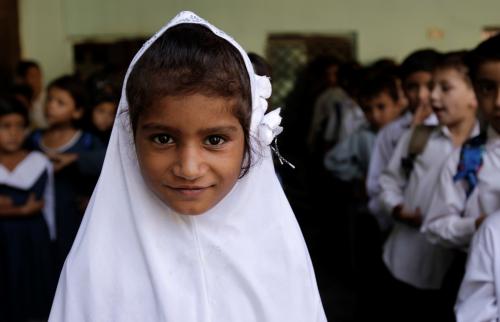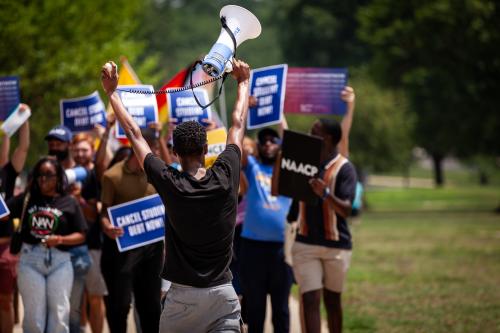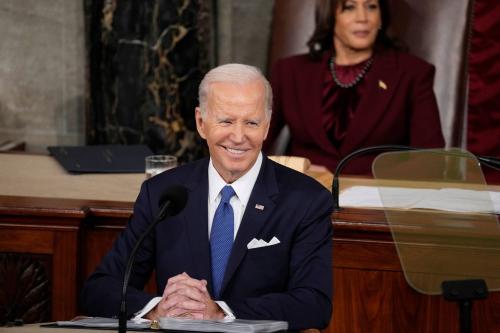As the incoming administration looks to “build back better” in the wake of COVID-19, fostering inclusive democracy globally must be high on the agenda. Progress down that path requires shifting the power and increasing the voice of those that have been disenfranchised. President-elect Biden’s planned Summit for Democracy in 2021 is an important opportunity to demonstrate that democratic health depends on the full participation of women and girls—particularly adolescent girls—at home and across the world.
The Biden administration’s focus on human rights as a foreign policy priority is a promising first step. And Biden’s chapter on gender equality in his foreign policy strategy sparks hope after a series of troubling trends in U.S. leadership.
But Biden must go beyond his campaign promises and prioritize the inclusion of adolescent girls in U.S. foreign policy decisionmaking. Such actions could redress power imbalances that have perpetuated harmful gender norms, negatively impacting the lives of adolescent girls globally and undermining our democratic values.
The unique vulnerability and untapped power of adolescent girls
While the last 25 years have brought progress for women’s and girls’ well-being, gains remain uneven and have increasingly widened due to COVID-19. Adolescent girls around the world face disproportionate and often intersecting inequalities by nature of their age and gender. This includes increases in child marriage and other forms of gender-based violence, adolescent pregnancy, loss of education, and increased care and domestic labor in the home.
Adolescent girls are essential stakeholders in advancing human rights for themselves and others. When their experiences and solutions are considered in decisionmaking, resulting policies tend to be more effective and responsive to their needs. However, it is hard for girls to participate in civic and political processes when their perspectives are not considered within their communities. The disproportionate challenges faced by girls are a sign that in too many places around the world, public policy is failing them. And unless their voices are heard, this trend is likely to continue.
Opportunities for the new administration
To turn campaign promises into transformative action for adolescent girls, President-elect Biden can take three important first steps:
1. Announce a global adolescent girls initiative in the first 100 days
The Biden administration should bring a high-level delegation to upcoming global moments including the 65th Commission on the Status of Women in March, which will focus on women’s political participation, as well as at the Generation Equality Forum and announce an initiative on adolescent girls. This will pave the way to the Summit for Democracy later in the year. A global adolescent girls’ initiative should identify and address the intersecting barriers girls face. The administration has already stated its commitment to eliminating gender-based violence at home and abroad. This must be pursued alongside efforts to address girls’ loss of education, economic opportunities, and health services, among others.
2. Support US legislation on adolescent girls’ civic and political participation
The U.S. State Department and U.S. Agency for International Development should support funding for girls’ civic and political participation, including through bipartisan legislation already introduced to Congress. Global governance structures and policy spaces typically lack participatory mechanisms for adolescents. Even when mechanisms do exist, girls are more likely than boys to face discrimination and other challenges in accessing them. U.S. government programs that promote girls’ civic and political participation will help girls to realize their full potential and transition into our future women leaders in public and private spheres.
3. Create an interagency working group on gender equality
The Biden administration should create an interagency working group on gender equality that would emphasize action to support adolescent girls, including by working to end child marriage. Child marriage results in the loss of girls’ education and the perpetuation of poverty within the family. Research demonstrates that COVID-19 has increased rates of child marriage due to the disruption of protection programs, school closures, and economic pressures.
Walk the talk
A necessary step toward challenging discrimination and advancing gender equality lies in the inclusion and participation of adolescent girls and girl-led groups from around the world in U.S. policymaking. For the Summit for Democracy to authentically promote democracy, it must integrate groups suffering most acutely from social inequalities.
We urge President-elect Biden to turn his campaign promise on gender equality into practice by being responsive to girls’ needs across the life cycle. In doing so, America will reestablish itself as a global leader for human rights and girls empowerment.









Commentary
Going beyond campaign promises on gender equality: A seat at the table for adolescent girls
December 14, 2020